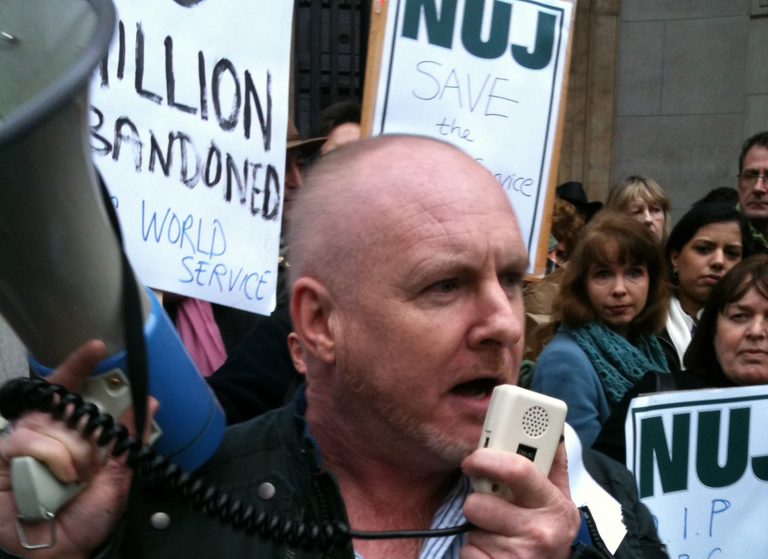BBC journalists in Brighton, hometown of Journalism.co.uk, are taking part in today’s nationwide strikes at the corporation over compulsory redundancies. Staff at BBC Radio Sussex formed a picket outside the station’s offices on Queen’s Road this morning (1 August) from 4am, leaving management to find non-union staff to present the station’s programmes.
The mid-morning show, which airs from 9am-12pm, was produced at the Sussex offices by stand-ins and broadcast simultaneously by BBC Kent Radio.
There are no compulsory redundancies proposed at BBC Sussex, but Paul Siegert, the NUJ rep for the region, told Journalism.co.uk this morning he feared that the implementation of BBC’s Delivering Quality First Strategy could lead to cuts at the station.
“We know that there is a thing that BBC management are looking at at the moment called DQF, which we call Destroying Quality Forever, which is going to mean that there will be 20 per cent cuts across the BBC, and so we are expecting that there will be job cuts in places like this if we don’t take action now.”
Danielle Glavin, Siegert’s deputy at the Sussex chapel and West Sussex reporter for the station, said: “We are just trying to protect the BBC, otherwise it will be desolated”.
John Lees, the station’s sports correspondent, was outside the BBC Sussex building at 4am this morning to begin the picket, about the time he would arrive for work. His part of the show was presented by another member of staff this morning. He said that no union members had crossed the picket line in Sussex, and that the staff were “standing firm” in today’s strike and in the indefinite work to rule beginning tomorrow.
“Either you’re an NUJ member or you’re not, and if you are you’ve got to support to strike. And we do.”
Also among the picketers was Kathy Caton, a World Service employee on a year’s attachment in Sussex. Caton is among those to have already been made compulsorily redundant, and would have been forced out of the BBC last month if she had still been working out of the World Service offices at Bush House, London. Because of her attachment to BBC Sussex, she has a stay of execution until next June.
She told Journalism.co.uk that there is “simply no fat to cut away” at the local station.
“Everything is done on such a tight ship, and to achieve the cuts that the BBC has planned means losing jobs, losing services and losing programmes.
“But there’s no slack here, people aren’t sitting around eating foie gras and swilling it down with champagne. It’s a tight ship.”
Caton will see out her attachment in Sussex until June next year, and then join the other World Service staff forced out by the cutbacks. The BBC intends to make 100 staff compulsorily redundant, out of a total of 387 job cuts across the World Service and BBC Monitoring.
She praised the World Service as “one of the finest things that the BBC is involved in”.
“What it produces versus its annual cost is extraordinary. To kill it off so fundamentally is something future generations will look back on and despair.”
The BBC has defended the need to make compulsory redundancies in order to achieve the savings set out by last year’s comprehensive spending review. Lucy Adams, the corporation’s director of business operations, said in a message to staff today that the corporation could not agree to the union’s demands for no compulsory redundancies.
“Following the cuts in central Government grants to the World Service and BBC Monitoring we have had to close 387 posts, meaning that regrettably there are nearly 100 staff who as a result are facing compulsory redundancy. We have been working with all these affected staff to ensure that they have opportunities for redeployment and retraining but we cannot and will not give preferential treatment to individuals depending on their union status.
“We hope the NUJ will realise that these issues are best solved at a local level, and a national strike that penalises all our audiences is not in the interests of their members, other BBC staff or licence fee payers.”
See more from Journalism.co.uk on industrial action and cuts at the BBC at this link.
Hear Rachel McAthy’s interview with Paul Siegert below:

